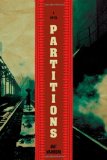 I’m sitting at a barbecue with a group of people, and I discover that one grew up in Pakistan. “I’m reading a book right now about the partition of India and Pakistan, and the violence of that time,” I mention.
I’m sitting at a barbecue with a group of people, and I discover that one grew up in Pakistan. “I’m reading a book right now about the partition of India and Pakistan, and the violence of that time,” I mention.
“Whose side is it written from?” he asks me.
“The author is really presenting both sides, but the narrator is a dead Brahmin Hindu,” I say, and get no further. The entire table wants to talk about the dead narrator.
So I will begin by telling you that the narrator is dead. However, this works out fine in the book. It really doesn’t read much differently than the normal all-seeing 3rd person narrator, except the parts where he wants desperately to get involved and can’t, as pure ephemeral spirit, move anything physical.
It’s 1947. India and Pakistan are being divided and apparently everyone is furious about it. This is what I do not understand. I understand it historically, and I understand the rationale behind it a bit. But I do not understand the violence, from all sides against all sides. Why on earth would people hunt down others who are trying to leave and brutalize them? I do not understand this world.
Partitions follows 4 characters in detail. First of all are Hindu twins Shankar and Keshav, the 6 year old sons of the (dead) narrator. We watch as they are separated from their mother at the train station, and follow them in their wanderings through the city, in search of their mother and someone to watch over them. We also follow Simran Kaur, a Sikh girl who escapes out the window from her father, who is planning to dull her with morphine and then shoot her. He does this to protect her, knowing the mobs of Muslim men outside their house will soon arrive to first rape and then either brutally murder or enslave her, her sisters and her mother. Simran is the only one to escape, and we follow her journey with bated breath, as she must battle overwhelming odds to survive. Last of all is Ibrahim Masud, a Muslim doctor in Punjab. Angry Hindu mobs destroy his clinic and he limps towards Pakistan, himself at risk, stopping to care for every wounded person he meets. When he does at last reach the refugee camp on the Pakistan side of the border, he doesn’t stay to join the British doctors and nurses who are caring for a never-ending stream of arrivals. These are the ones who have survived, he realizes, and goes back out to the dangerous fields to care for those who won’t otherwise make it. In a beautiful and satisfying stream of events, he meets and cares for both the twins and Simran.
In spite of the violence, I really enjoyed this book, which surprised me. I usually hate books where men with swords wait on train platforms for trains to stop, then wade in and kill everyone on board. Perhaps it is because the book did not go into excessively gory detail, so it did not feel gratuitous. Perhaps it is because the book somehow presents hope, that all people are not relentlessly evil, that some resist and see humanity in all regardless of the way one’s turban is tied or whether or not one eats meat. Certainly, it is because Partitions is very well written, with characters that manage to be nuanced even in the middle of extreme circumstances. If you are someone who enjoys novels that relate historic times and events, or if you are interested in India or Pakistan, I highly recommend this book. It’s poetic sweep shows us good and evil alike, like the world that exists around us, a mix of both extremes that still manages to contain beauty.
Elizabeth enjoys reading well written books that leave her with hope. See what else she’s been up to at her blog Planet Nomad.